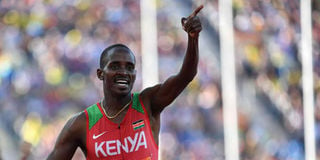Elijah Manang'oi banned for doping offence

Kenya’s Elijah Motonei Manangoi wins the athletics men's 1500m final during the 2018 Gold Coast Commonwealth Games at the Carrara Stadium on the Gold Coast on April 14, 2018.
What you need to know:
- Athletics Integrity Unit (AIU) had on July 23 flagged down the 2017 World 1,500m champion over whereabouts failures
- AIU has since found Manang'oi guilty and banned him for two years starting December 22, 2019 - which is the date of third whereabouts failure - to December 21, 2021
Kenyan middle-distance athlete Elijah Manang'oi has been banned for two years for a doping offence.
Athletics Integrity Unit (AIU) had on July 23 flagged down the 2017 World 1,500m champion over whereabouts failures.
But AIU has since found Manang'oi guilty and banned him for two years starting December 22, 2019 - which is the date of third whereabouts failure - to December 21, 2021.
"Disqualification of all competitive results obtained by the athlete since 22 December 2019 with all resulting consequences, including the forfeiture of any titles, awards, medals, points prizes and appearance money," read the ruling from AIU.
Manang'oi had three missed tests in the 12-month period beginning on July 3, 2019 followed by November 12 and December 22 of the same year.
In the first incident, Manang’oi asserted that, on July 2, 2019, his connecting flight from Frankfurt to Nairobi had been delayed and as a consequence he only arrived in Nairobi at around 11pm on July 2 2019.
Manang'oi claimed that his luggage did not arrive with him from his original departure destination (San Francisco) and that his house key was in his luggage.
No negligence
Manang’oi stated that he had tried to change his Whereabouts information but “couldn’t do because time couldn’t allow because it was already past midnight”. As he did not have his house keys, he had stayed in the nearest airport hotel which led in turn to his missed test in Rongai the following morning.
However, AIU indicated that the athlete’s explanation failed to demonstrate that no negligence on his behalf caused or contributed to his failure to be present and available for testing during his designated time slot on July 3, 2019 or to update his Whereabouts information.
On November 12 missed test, Manang'oi stated that, on the morning of the said date, he was returning home from a night shift connected to his role with the Kenya Police Service, but that due to traffic, he had been unable to make it to his nominated address before the end of his specified time slot.
The AIU concluded that the athlete should have updated his Whereabouts information as soon as he encountered the traffic jam. That the athlete should have appreciated that there was a risk that he would not be present and available for testing at his registered Whereabouts location during his 60-minute time slot that day.
About his third missed test, Manangói stated that he had been injured since August 27, 2019 and that, in December 2019, he had travelled to Austria to receive a further diagnosis and treatment in respect of that injury.
The athlete explained that he had delegated full responsibility for his Whereabouts information and updates to a third party in Kenya, but the party made a mistake when entering the details of his trip into ADAMS.
The AIU noted that, as an athlete included in the World Athletics Registered Testing Pool, he remained personally responsible for ensuring that he is available for testing accordingly and should not use a third-party as a defence to an allegation of missed test.
Manang'oi becomes the second high-profiled Kenyan athlete to be banned within one month after the 2017 London Marathon champion Daniel Wanjiru, who was handed a four-year ban after being found guilty of doping violation.
AIU had provisionally suspended Wanjiru on April 14 this year after anomalies were discovered in his Athlete Biological Passport under the World Athletics Anti-Doping Rules before exerting the ban on October 15.
The Disciplinary Tribunal announced on Wednesday that the 28-year-old Wanjiru’s ban takes effect from December 9, 2019 hence all of his results from March 2019 have been rendered invalid.
Rising doping cases
Nine Kenyans have now been suspended for various doping offences in just four months of which two have won the London Marathon. Besides Wanjiru, Wilson Kipsang, who won in London in 2012 and 2014, was handed a four-year ban in June for whereabouts violation and presenting false evidence.
Wanjuru’s ban came three weeks after another long distance runner Patrick Siele, who finished 12th at Venloop Half Marathon in the Netherlands and ninth at Cardiff Half Marathon in Great Britain last year, was banned for three years and six weeks.
Another Kenya’s long distance runner Philip Kangogo had also weeks earlier been handed a two-year suspension.
Siele and Kangogo join the long list of Kenyan athletes who have been banned for a period ranging from two years to eight years for violating the whereabouts rule or taking prohibited substances this year.
Mercy Kibarus got an eight years ban from September 2019 for presence of a prohibited substance as long distance runners Kenneth Kipkemoi and Alex Oliotiptip got two years each for substance abuse and whereabouts failure respectively.
Others who have been handed four years ban each are Mikel Kiprotich Mutai, Vincent Kipsegechi Yator and Peter Kwemoi after taking prohibited substances.
There are cases still pending this year including that of 2014 World Under-20 800m champion Alfred Kipketer, and James Kibet.





